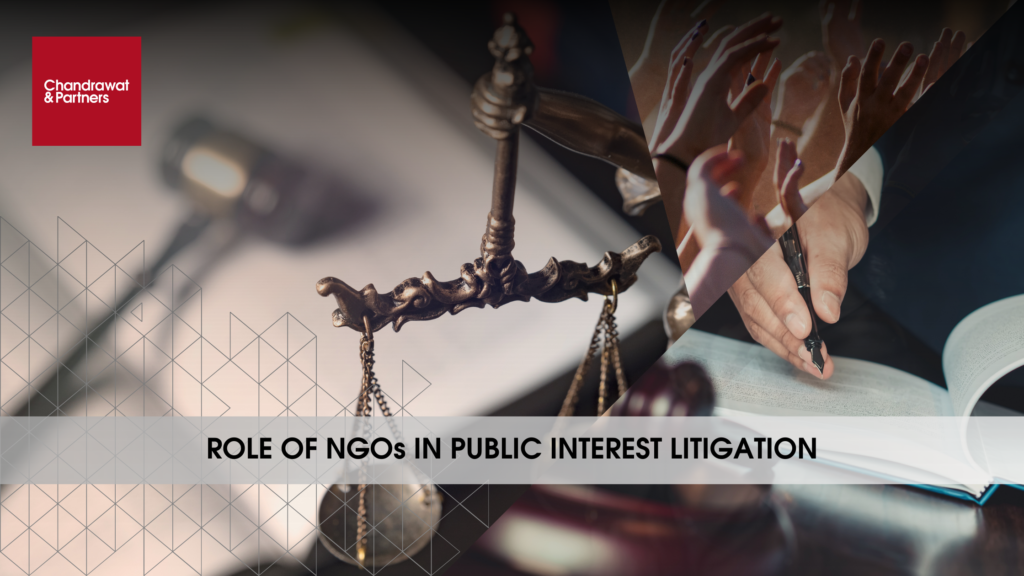Share :
NGOs AND THEIR IMPORTANCE
Non-Governmental Organizations (“NGOs”) are non-profit entities that operate independently of government control. They are typically formed by individuals, groups, or associations with common interests or goals, such as promoting social welfare, advancing human rights, protecting the environment, providing humanitarian aid, or advocating for specific causes. NGOs can vary in size, scope, and focus areas, ranging from local community based organizations to large international entities with global reach. They play a crucial role in civil society by undertaking various activities such as advocacy, research, capacity building, service delivery, and policy influence, often complementing or supplementing government efforts in addressing societal issues.
In legal activism and social change sector, NGOs plays key role in advocating for public interest causes through Public Interest Litigation (“PIL”). PILs have become a powerful tool for promoting social justice, protecting human rights, and addressing systemic issues.
PUBLIC INTEREST LITIGATION
Public Interest Litigation (“PIL”) in India is a legal mechanism that allows individuals and organizations to seek judicial intervention in matters of public concern. Article 32 of the Indian Constitution grants the right to move the Supreme Court for the enforcement of fundamental rights, while Article 226 empowers High Courts to issue writs for the enforcement of fundamental rights as well as for any other purpose.
TECHNICAL ASPECTS OF PIL
- Origin and Evolution: PIL in India evolved through judicial activism, expanding the scope of legal remedies beyond individual grievances to issues affecting the public at large.
- Standing to Sue: Unlike traditional litigation, where only affected parties can file cases, PIL allows any person or NGO acting in public interest to approach the court.
- Jurisdiction: Supreme Court and High Courts have jurisdiction over PILs, with the former focusing on fundamental rights and the latter addressing broader public interest issues.
- Writ Jurisdiction: PILs often involve writ petitions under Article 32 (Supreme Court) or Article 226 (High Courts), including writs like Habeas Corpus, Mandamus, Prohibition, Certiorari, and Quo Warranto.
HOW NGOs INITIATE PILs IN INDIA
NGOs play a vital role in PILs in India by advocating for public interest issues, providing legal support, promoting accountability, and fostering public participation in the legal process. Their efforts contribute significantly to advancing social justice and upholding democratic principles. NGOs often serve as catalysts for initiating PILs by identifying critical issues that require judicial intervention. They have the advantage of grassroots connections and expertise in specific areas such as environment, health, education, and civil liberties. Through deep and analytical research, documentation, and collaboration with affected communities, NGOs bring forth compelling cases that merit judicial scrutiny.
REPRESENTING MARGINALIZED VOICES
One of the significant contributions of NGOs in PILs is amplifying the voices of marginalized and vulnerable populations who may not have direct access to the legal system. By representing these voices, NGOs bring attention to systemic injustices and advocate for inclusive and equitable legal remedies.
CHALLENGES AND OPPORTUNITIES FOR NGOs IN INDIA
Despite their significant contributions, NGOs face challenges such as limited resources, legal hurdles, and backlash from vested interests. However, these challenges also present opportunities for collaboration, innovation in legal strategies, and building alliances with other stakeholders committed to promoting public interest.
- Many NGOs operate on limited budgets, making it challenging to sustain long term legal battles or fund extensive research and advocacy efforts.
- NGOs often face legal hurdles such as complex procedural requirements, delays in court proceedings, and opposition from well funded adversaries.
- Some NGOs may lack legal expertise internally, leading to dependence on external legal professionals and potential challenges in coordinating legal strategies effectively.
- Political pressures and interference can hinder NGOs ability to pursue certain causes or access legal remedies impartially.
- NGOs can leverage partnerships with legal experts, universities, advocacy groups, and international organizations to enhance their legal capacity and share resources.
- Strategic litigation allows NGOs to strategically choose cases with high impact potential, creating legal precedents and driving systemic change.
- Investing in training programs and building internal legal expertise empowers NGOs to handle legal challenges more effectively and independently.
- Engaging the public through awareness campaigns, fundraising efforts, and grassroots mobilization can garner public support and strengthen NGOs advocacy efforts.
IMPACT AND FUTURE DIRECTIONS
The impact of NGOs in PILs is evident in landmark judgments that have advanced human rights, environmental protection, and social justice. Looking ahead, the role of NGOs will continue to evolve, with emphasis on strategic litigation, capacity-building, and leveraging technology for legal advocacy.
NGOs play a dynamic and indispensable role in Public Interest Litigation, serving as catalysts for change, advocates for marginalized communities, and guardians of public interest. Their collaborative efforts with legal professionals, affected communities, and civil society organizations are instrumental in shaping a more just and equitable society through the judicial system.
How we can help?
We are committed to supporting NGOs in pursuing PIL and advancing their advocacy for societal welfare, human rights, environmental protection, and other public interest causes.
- Our team of experts assess PIL cases, develop legal strategies, and ensure alignment with public interest objectives.
- Our firm conducts thorough legal research, draft precise legal documents, and ensure compliance with procedural requirements.
- Our experienced professionals represent NGOs in court, advocating for their interests and presenting compelling legal arguments.
- Our team facilitates settlement negotiations and alternative dispute resolution processes when beneficial for the NGO’s goals.
For more information or queries, please email us at
enquiries@chandrawatpartners.com




